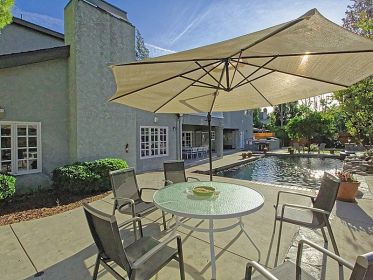Medication-Assisted Treatment
Medication-Assisted Treatment (MAT) for Addiction in Los Angeles
Many individuals have a misconception about medication-assisted treatment for addiction or alcohol dependence. They wrongly assume that MAT is for drug substitution. The truth is that MAT is much more than that. Medication-Assisted Treatment in Los Angeles through Harmony Place can give you the advantage you need to overcome dependency once and for all.
It would be best to visit the right environment that equips you with sufficient knowledge of MAT, behavioral therapies, and how to treat opioid addiction.
Harmony Place remains the best as regards matters of mental health services administration. Unlike some treatment centers, we are licensed to provide quality MAT during the detox stage of treatment. Our treatment process is purpose-driven, as getting a result is our mission.
Do you want to know more about medication-assisted treatment and how it solves substance use disorders? Keep reading.
Did you know MAT is actually used to help relieve the withdrawal symptoms and reduce the psychological cravings caused by the chemical imbalances in the body?


What Is Medication-Assisted Treatment (MAT)?
MAT is primarily used to treat addiction to opioids such as heroin and prescription pain relievers containing opiates. The prescribed medication normalizes brain chemistry, blocks the euphoric effects of alcohol and opioids, relieves physiological cravings, and normalizes body functions without the harmful and euphoric effects of the original substance used.
Harmony Place is not a stereotypical clinic. We are not another methadone or Suboxone clinic. However, if our clients need this treatment, we often recommend that they return to the clinic each day and not miss their next dose. Nevertheless, this is a temporary strategy as we provide further assistance.
During MAT, we only dispense FDA-approved medications. These medications do not fulfill all of the addiction treatment. As a result, we apply other forms of clinical, evidence-based, and holistic therapy like medical detoxification. During the detoxification process, clients may go through painful withdrawal symptoms. Withdrawal from certain substances can be uncomfortable and even life-threatening in some cases. A medication-assisted detox can help ease the impact of drug and alcohol withdrawal. Since detox addresses the serious physical effects of withdrawal, medication-assisted treatment and supervised drug and alcohol detox is recommended to manage withdrawal symptoms for some substances more than others.
Call Us 24/7: (855) 652-9048
Medication-Assisted Treatment at Harmony Place
Our physicians are professionals who thoughtfully prescribe certain medications when needed. We place some clients on a detox medication regimen to ease withdrawal symptoms. But, we taper off such medicines when it is safe. We do the same for addiction medicine. For this reason, you can rest assured that Medication-Assisted Treatment in Los Angeles through Harmony Place is professionally monitored, safe, and effective.
Most times, MAT involves treating heroin and opioid overdose, leading to dependence on the prescribed drug instead of the previous drug. However, our comprehensive treatment plan helps to overcome this. These three leading FDA-approved medications may be used:
-
Methadone (Methadose or Dolophine)
-
Buprenorphine (Suboxone or Zubsolv)
-
Naltrexone (Vivitrol) – sometimes used to reduce cravings upon discharge
Medication-Assisted Treatment FAQs
People have different questions about medication-assisted treatment (MAT). However, here are the most familiar questions people ask us:
No. We only prescribe medication during detox when our treatment team deems it absolutely necessary. This depends on the type of substance the client used as well as the severity of the addiction.
Some clients skip the detox and residential portions of treatment and start outpatient treatment when their addiction isn’t as dire. So, to reiterate: No, not every client will need to take detox medication during their first few days with us.
Following SAMHSA’s guidelines, we think clients are good candidates for medication-assisted treatment (MAT) if they:
- Are diagnosed with an addiction to alcohol or opioids.
- Can fully comply with prescription instructions.
- Are fully educated on alternative options.
- Do not have physical health conditions that may get worse with the prescribed medication.
- Do not have a history of medication misuse.
- Appear to be motivated to get sober.
The first thing that must be done to begin the recovery process is to free the body of all mind-altering substances through detoxification. Evaluating the length of time and the client’s dependency on drugs or alcohol is crucial in implementing a safe detox regimen and any additional services that may be needed.
During detox, the body experiences withdrawal symptoms that differ depending on substance use. Detox is an intense process that affects the body as well as the emotions of an addict.
Strong emotions can erupt due to physical discomfort and the inability to take drugs to cope like an addict normally would. A nurse, a doctor, or a therapist can help manage the pain of detoxification through supervision, support, and possible medication.
One classification of detox is sub-acute detoxification. This detox also calls for help cleansing the body of intoxicating substances. Sub-acute means that the withdrawal symptoms may not necessarily be as life-threatening or painful as other forms of detox. Clients in sub-acute detox are typically healthier and more stabilized after withdrawal.
Pharmaceutical drugs may be omitted during sub-acute detox because they may not be necessary in these situations. Withdrawal may be a little unpleasant without medication to alleviate the symptoms. Still, the amount of time to get all the intoxicating substances out of the body is much quicker.
Medication-assisted treatment (MAT) can be used in more extreme withdrawal cases. Sub-acute detox can then be used for tapering off those medications. In any scenario, it’s important to receive therapy and counseling beyond the detox treatment because staying sober is challenging without this additional support.
Certainly. Many of the top medical and recovery organizations in the country support MAT for substance use disorder. These groups include:
- American Medical Association (AMA)
- American Academy of Addiction Psychiatry (AAAP)
- American Society of Addiction Medicine (ASAM)
Since alcohol can cause some of the most potent withdrawal symptoms, it makes sense to use medication to alleviate the stronger symptoms in some clients. Besides naltrexone, other medications (and their brand names) that we sometimes use in alcohol treatment include:
- Disulfiram (Antabuse)
- Acamprosate (Campral)
MAT is an integral part of treatment at Harmony Place, but it’s far from the only approach to treatment we use. We’re also committed to providing invaluable clinical care, evidence-based psychotherapy, and holistic modalities.
Our evidence-based psychotherapy techniques for group and one-on-one settings include:
- Cognitive Behavioral Therapy (CBT)
- Eye Movement Desensitization and Reprocessing (EMDR)
- Narrative Therapy
- Motivational Enhancement Therapy (MET)
Our holistic therapy program includes such modalities as:
- Acupuncture
- Yoga
- Equine-Assisted Therapy
- Art Therapy
- Physical Training
Medication-Assisted Treatment (MAT) includes opioid antagonist therapy with methadone and buprenorphine. The drug is naltrexone, buprenorphine nitrate. According to SAMHSA, the medications used in MAT medication-assisted treatment programs are FDA-approved. Research shows that a combination of medication and therapy can successfully treat these disorders. For some people struggling with addiction, MAT can help sustain recovery. MAT is also used to prevent or reduce opioid overdose.
Medication-Assisted Treatment (MAT) includes opioid antagonist therapy with methadone and buprenorphine. The drug is naltrexone, buprenorphine nitrate. According to SAMHSA, the medications used in MAT medication-assisted treatment programs are FDA-approved. Research shows that a combination of medication and therapy can successfully treat these disorders. For some people struggling with addiction, MAT can help sustain recovery. MAT is also used to prevent or reduce opioid overdose.
-
Absolutely the best recovery center around.
I am forever grateful to have had this experience. I would recommend anyone who wanted help to come here. This place literally saved my life. I have overcome so many obstacles that always stood in the way of my recovery. It’s not just because I was ready… the approaches the therapists use come from an empathetic, compassionate, and understanding place. They were able to hold the mirror up and help guide me through making solid changes.
Daniel H.
August 2017 -
This place literally saved my life.
After overdosing, my parents forced me to check into rehab.After interviewing many other facilities, I decided to go to Harmony Place from my home in Phoenix. I was struggling with…a drug addiction and had been trying for years to recover. In the past, left 2 treatment centers AMA and 1 AWOL. I had very negative experiences in the other treatment facilities, especially with my therapists, so I didn’t go in with an open mind or good attitude- even though they worked with my parents regarding finances. However, the staff was patient with me. The techs were kind, knowledgeable, and many were in recovery themselves.
Mary M. -
They Answered on the First Call
When I called Harmony Place…I knew immediately that this was the right place for my child… Harmony Place is specifically designed for…and tailored to providing a safe environment. The staff [are knowledgeable and some are in recovery]. The staff knew each client and were on top of each client’s progress. Harmony Place has a small clientele and each client are able to receive all the help they were entitled to. I would recommend Harmony Place to anyone who is looking for a small setting… My daughter is currently going into sober living and her counselors did a wonderful job in finding a right fit for her – affordable, safe and a good environment for her.
Robyn
Loved-One -
I’ve Been Searching for the Perfect Words…
I left Harmony Place in August of 2015 and I have been searching for the perfect words to describe my experience during my stay; and still I can’t really find them. How do you really describe a place with a staff and a program that saved you? Addiction is a terrible thing to go through and a heart breaking thing for your loved ones to watch. Many people, including myself go into different treatment centers throughout their addiction searching for ways to find recovery. Nothing worked for me, not the 5 rehab stays I had, then, I came here.
Dominique C.
Alumni
Find Long-Term Success in Recovery at Harmony Place
We understand that the opioid receptors always want more – this is called opioid cravings. Hence, we prescribe medication during detox to address the harsher withdrawal symptoms and not merely replace the client’s previous addiction with another drug. This act is similar to using drugs to treat physical symptoms of chronic ailments. Addiction is a disease, and it is essential to employ MAT when necessary.
Please feel free to get in touch with us for help: (855) 652-9048




